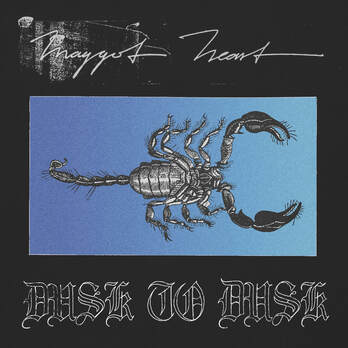
Written by: Blackie Skulless
Maggot Heart caught my attention for the sole fact that their cassette Dusk To Dusk was released through Caligari Records, despite not fitting with that label’s general ideal. Instead of being composed of extreme or filthy metal, it is rooted somewhere in the noise rock and post-punk spectrum. The delivery itself is clean and the frontwoman’s voice is captivating, but I think the fitting factor is that it’s still somewhat eerie. That allows it to appeal to a broader scope of fans. For the most part, Maggot Heart achieve this due to a very dominating bass presence passed through a somewhat degraded quality thanks to weird reverberation and rough production. Glazing that above a very concise bottom is what gives Dusk To Dusk such a strong identity. It focuses a lot on stompier riffs, showing itself in “Big Kross.” B-side opener “Strange Women” also highlights this by using a repetitive but catchy pattern.
0 Comments
The 30th of October, 2020: Bring Me The Horizon releases the first EP, Survival Horror, in their POST HUMAN quadrology, a set of four projects intended to all be released by the band within the span of a year. A young reviewer sets out to write about this latest release by one of her favourite bands, and spends almost two weeks barely able to write a single coherent paragraph about it. This is the result.  Written by: Izzy Writing this review has been probably the greatest struggle I’ve faced putting my thoughts out on any piece of music into words. Whenever I sat down at my desk and decided I wanted to express my love for and opinions on this album, I wanted to call it one of the best albums of the year and talk about how amazing it was, but I simply couldn’t type it out in a way I was happy with, or speak on it in a way that felt well constructed and not just rambling. And so here we are, on the fifth or sixth draft of this review, which I intend to write entirely in one sitting, because I really want to get this review over and done with after learning a few important things. Sometimes I need the time to properly digest an album and develop my thoughts on it, I intended this review to come out the Monday after SURVIVAL HORROR was released, and for a new release by one of my favourite bands of all time, that was not nearly enough time to truly integrate exactly how this album made me feel. It was more like an explosion of hype, I wanted to call it another masterfully crafted classic and just gush about it for 800 words, but as time has passed I’ve realized I do have some very real and numerous critiques of it. In the rush to cover the constant waves of new music, we all too often neglect discussing the releases that leave the most substantial impressions in our lives. As such, we recently invited some bands and artists to wax poetic about an album that was deeply impactful or influential to them, either musically or personally. The third guest to graciously offer a retrospective in this series is Steven of (intoxicatingly cathartic and emotive) dark electronica act aortaproject. Notably, this is the second of four(!) NIN retrospectives. Read on! 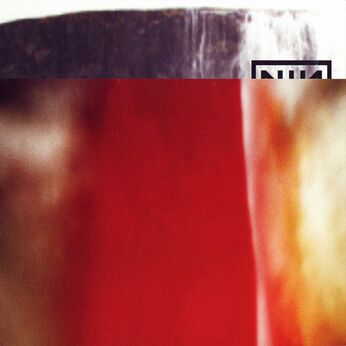 Written by: Steven of aortaproject Nine Inch Nails The Fragile: Trent Reznor's opus. Not his most critically acclaimed work, but for diehards, this is "all that could have been" for Nine Inch Nails. It's been almost 20 years since the iconic double album’s release in Sept of 1999 and I still couldn't be happier with it. The Fragile remains a staple in my reported influences, and a constant in my playlist. Even after thousands of hours of listening, I still find bits and pieces I haven't noticed before. Exploring the threads of Reznor's genius. The Fragile is laced with sonic texture, intricate layering, and an articulate blending of synthetic and natural elements, encroaching the frail temperament of stringed instruments with the powerful programming of electronic drums and pulsating synths. 
Written by: Scorpi
Let me set the scene. You’re in one of those fancy Venetian longboats. But you’re not in Venice, the budget in my imagination isn’t that large. But you’re on a river nonetheless. And up ahead there are towns & villages that light up the embankment of the river, this is where you’re heading. The boat jitters forward and starts floating across the river, smooth as silk. The start of this journey is accompanied by “Rengeteg,” the first track off of Ajna’s debut album of the same name. This leg of the journey is soothing and relaxing. You can hear birds singing, then some chirpy, catchy guitar melodies start playing in your head, along with a catchy drum beat. The boat travels along at a steady pace as you take in the sights. There’s some pretty, forest-like landscapes on the embankment with the setting sun shimmering through the leaves. More pleasant guitar licks are playing in your head, along with some funkier bass lines now but they aren’t front and centre, rather sitting gently underneath the pleasing guitar sounds. The music gets a little livelier every now and then, much like the excitement building within you to get to the first stop on your journey. 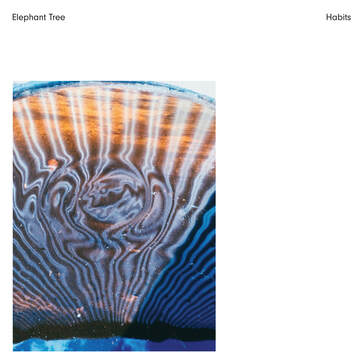
Written by: Vattghern
I’m a critic at heart. Chance is, if you spend just a little bit of time with me, you’ll roll your eyes at me constantly being nitpicky about everything that decides to fall into my hands, so to speak. Naturally my nitpickiness is ever so present when new music awaits judgement, which results in few things really blowing my socks off. Yet one song that sparked my interest when browsing Bandcamp pretty early in 2020--when toilet paper was still available en masse and doing one’s groceries didn’t feel like Russian roulette--did just that: blow my socks off. “Sails” by Elephant Tree was neither from a genre I was fond off nor was it from a band I previously knew. Despite that, I fell in love, excessively hitting the play button. So, when the promo sheet was updated and I spotted Elephant Tree’s new studio album Habits, my eyes lit up and I instantly messaged the Village Overlord, begging for a promo copy. As you’ve already guessed, my request was heard and here I am, reviewing Habits, the new album by stoner rock aficionados Elephant Tree. 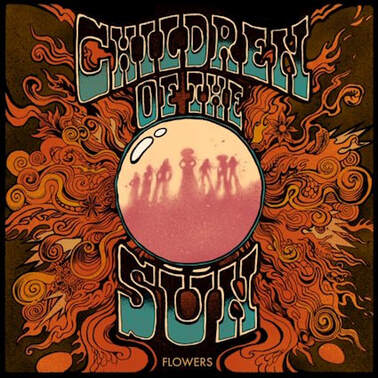 I am not a child of the 60's or 70's. I am, however, a child of a child of the 60's and 70's, and that has made all the difference in my current state of musical appreciation. Not to say the hippie aesthetic is my thing--far from it--but folk and proto-rock planted a certain something, and every once in a while, it's fun to revisit. Enter Flowers, the forthcoming debut LP from Sweden's Children of the Sün. Sonically and thematically, Children of the Sün's brand seems, at first blush, easy to place. Vocal harmonies? Check. Liberal application of hammond-esque keys? Check. Pitter-pat percussion? Check. Airy acoustics? Check. Back-to-the-earth sentimentalism? Double check. Take your favorite carefree folk rock--Traffic or perhaps Blind Faith as several examples among many--and mix, sparingly, with the modern edge and vocal prowess of MaidaVale or Halos and Hurricanes-era Avatarium. The latter may be a stretch, but Josefina Berglund Ekholm and Jennie-Ann Smith certainly share similarities in syrupy-yet-grounded delivery. 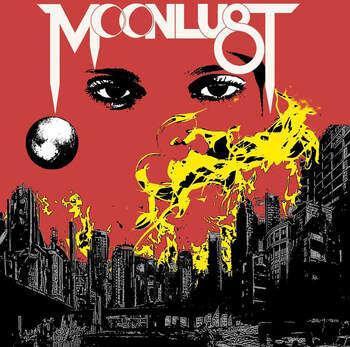 If you haven't yet checked out Bostonian power trio Death Pesos, but had the chance to skim through the playlist they graciously curated for the Village over on spotify...you've got a pretty decent picture of what awaits. Scuzzy riffs and grimy licks are the name of the game. Throw some forthright aggression in the direction of the drums, supplement heavily with groovy bass, and bury deep in the mix some filtered buzzsaw vocals, a la your favorite Uncle Acid. These self described “garage-metal stoners” are all about noisy guitar, fuzzy ambiance, and rockin’ attitude--and on their latest single/B-side, they present a raw and rollicking amalgamation of influences. It's high-quality fuzzy rock ‘n’ roll, so we've gotta roll out the red carpet: with echoes of Cream, to Captain Beyond, to Stoned Jesus, to Faux Ferocious, to Graveyard, there's a lot of influential sounds on display in these 7-ish short minutes. 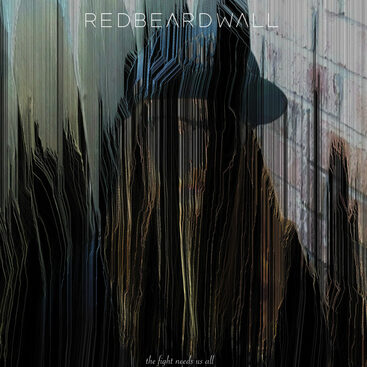 Once I know something about a musician’s character, separating that knowledge from the fruits of their labor can be, well, a laborious affair. In the case of Red Beard Wall, that certainly isn't a bad thing. Judging from our interactions, I have gathered that whatever the red-bearded frontman Aaron Wall does, he does with the utmost enthusiasm and fervor. Take, for example, his online comments, which remain an ALL HAIL hailstorm of goat and flame emojis. His persona’s omnipresence feels remarkably sincere, and is always realized with noteworthy vivacity--which, in turn, results in a unique sound solidly founded on glorious zeal. Less we get too highfalutin, let me state the obvious: Red Beard Wall is also really fucking weird. Rest assured, this slumbering villager likes weird. Weird is what gets me up in the morning, and The Fight Needs Us All is the epitome of this oddball brand I have come to wholeheartedly enjoy. Several months back we ran a brief review of “The Warming,” lead single from the Wall’s sophomore effort. While recycling may be in bad form, these are words I stand by: “Red Beard Wall plays a wickedly cacophonous brand of sludge--a brutal slugfest between the hooky pseudo-melodic stylings of Torche or Helmet, and the bayou groove of NOLA’s finest...this is sludge rock at its best--thick, unique, and relentlessly repeatable. It’s a rabble-rouser, a neck-snapper.” At the time, “The Warming” seemed a distillation of the components that make this project so special...and now, given wider vision, I consider it the focal point of the album. No question: “The Warming” is truly the hottest track amongst a cabal of barn-burners. The obvious first stop on the road to dissecting the Red Beard Wall methodology is the two-tongued vocal style, split between throat-wrenching screams and along-the-riff cleans. It’s a real Jekyll/Hyde situation, and throughout the album, Wall continually pulls off the odd juxtaposition with a delightfully bludgeoning grace. While contrasting vocals certainly aren’t new in the world of sludge nor rock, there is little out there that demonstrates a similarly visceral approach. And while this dichotomy has always been the outfit’s strongest suit, both forms of delivery have improved significantly from debut in several ways. The screams are increasingly savage, in the pent-up-animal sense of the word. Conversely, Wall’s cleans are employed with increased regularity, adding a much-needed melodic focus to the pummeling riffs. The guitar itself is utterly sasquatchian--never floundering in whimsy, but remaining rooted in straightforward groove. There’s glimmers of influence here, from the scuzzy heft of early Bill Kelliher, to the head-bopping flow of Siamese Dream-era Billy Corgan. Thick and heavy, the guitar remains a cornerstone for the vocal acrobatics. The back-to-back punch of “Come On Down” and “To My Queen” is a prime example of this technique in practice. And! Lest they be forgotten, the militaristic drums match the riffage in terms of aggression and sheer weight, pound-for-pound. Viewed as a whole, The Fight Needs Us All is a bloody bout, rather than an exercise in instrumental harmony. The album is compulsively listenable and endlessly enjoyable, yet from a songwriting perspective, there are some oddly paradoxical challenges. The general structure is unique, but that uniqueness doesn’t indicate an overly sophisticated plane of songwriting. This results in a number of Side-B moments recalling--perhaps too strongly--that which came before. Realistically, a weird approach becomes less weird each time you hear it, and for this reason, some variety throughout would accent the potency of Red Beard Wall’s core motif. That said, existing breaks in the formula do contribute significantly to the beginnings of a balance. The doomy instrumental ambiance of “Reverend.” The slower moments of “Tell Me The Future of Existence,” which recalls early Mastodon at their most somber--think “Trilobite.” The alt-rock pace at which clean vocals passages weave between riffs on the aforementioned “Ode to Green.” Given Wall’s obvious ability to seamlessly break (and subsequently bridge) genre expectations, I’m hopeful that the future bodes well for continued experimentation. A wall may be stationary by definition, but with two high-quality albums at this stage, Red Beard Wall is dealing with the kind of structural stability that allows for flourishes. Y’know, ramparts and gargoyles and shit. The Fight Needs Us All builds on the promise Red Beard Wall previously displayed, and, for the sake of comparison, this album has spent more time pummeling my eardrums than any other this month. It’s ridden with meaty hooks and melodic swells. It’s relentlessly repeatable, passionately aggressive...and just off-kilter enough to merit a double-take. As the soundtrack to a purported revolution, it remains as invigorating as ever. In sum? Red Beard Wall requests--nay, demands--your presence at the fight. All Hail! Red Beard Wall - The Fight Needs Us All was released Feb. 22nd from Argonauta Records. 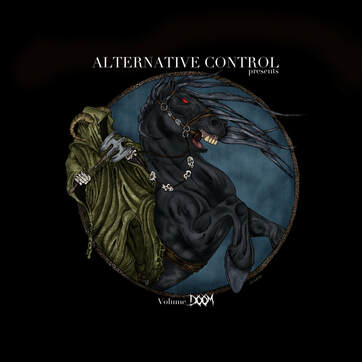 Considering that this particular villager is decidedly one of those “album guys,” for whom singles without context hold little intrigue, reviewing a compilation is a difficult affair. Jumping from artist to artist with nary a backward glance necessitates finding a common thread, and in the case of (fellow music blog) Alternative Control's excellent Volume Doom, that thread is obvious: despite a wide range of technique, application, and general sonic appeal, every band here exemplifies the spirit of the low ‘n’ slow. Even at first blush, you’ve got a fine range on display, from the rockin’ riffage of Owl Maker’s desert groove, to the gargantuan swampy bass of Gorge, to the ethereal tones of Eye of Nix. The stoner and doom umbrella is well represented herein, and with international, national, and local Connecticut bands alike, Volume Doom defines the ideal conglomerate. While followers of said genres will undoubtedly recognize some names here (see Year of the Cobra, 1476, and the UK’s ever-intimidating Kurokuma) there are some greenhorns as well. The most obvious example of the unheard contingent is Low Moment, whose austere-yet-oddly-emotive “Plague, Take Me Low” is--I shit you not, folks--their first and only recorded track. Between exist a variety of other groups, all of whom make exceptional use of the platform this compilation affords. At risk of showing all my cards, it’s fair to say that Volume Doom contains no skippable tracks, and if we sway you to listen, you should listen to it all, dammit. That said, resorting to describing each track (and thereby band) seems unfortunately inefficient, so while I stress that each and every song here deserves a wholehearted shout-out, we’ll trim things down to three tracks that left a particularly prominent impression. First up we have Howling Giant, whose adventurous “The Pioneer” recalls, thematically, something Rush might have conceived in a blaze of typical lyrical prowess. While not narrative per se, “The Pioneer” makes use of tasteful samples and follows a distinct protagonist, resulting in a perpetual desire to return to the track time and time again. Call it akin to the satisfaction of re-reading a good book. Groovy yet progressively light on their feet, Howling Giant bring in both mighty riffs and subtle synths. Behind it all, at the helm of their galaxy-trawling craft, sits Zach Wheeler, bringing a level of subtle sophistication to the percussion that is, for lack of an appropriate metaphor, a genuine joy to take in. Next up is “False Martyr” from Philadelphia's own Witching--a group that, evidently, knows how to kick in the door. Following a wonderfully misleading intro, Jacqui Powell lets it rip, self-exorcising vile caustic howls. A potent blend of blackened anguish and hardcore fury, if e’er there was. Whether reverb-stricken or charging forth with fuzzy angularity, the guitar tone is masterful on all counts, seamlessly maintaining a sense of direction amidst the track’s violent ebb and flow. “False Martyr” is doggedly forceful, and hits harder than anything else Volume Doom has on display. Despite sounding different, in the grand scheme, than its stoner-influenced brethren, Witching’s contribution works quite well as a focal point. Lastly we have Dust Prophet, whose “Revolutionary Suicide” is an eerie (if irresistible) romp. Heather Lynn belts out a hook like few can, but that’s not the only draw: hefty guitar, massive drums, and a noticeable attention to detail in the ambiance department set Dust Prophet apart. All told, this track has a certain commercial appeal--and coming from an underground blog, I can see the implications, but bear with me. Few bands under the riff-worshipping fold can claim this level of sheer head-bopping ‘n’ air-guitar wielding gravitas. A spoken word intro and some squealing intrusions underneath the riffs provide the necessary balance--all the weirdness one needs to really stand out in a crowd. The result? A remarkably ear-wormy addition to the comp. Because, alas, I must maintain a critical edge even in the midst of doomy excellence, it’s worth mentioning that Year of the Cobra’s contribution--opening track “The Descent”--doesn’t quite match my expectations given this Seattle powerhouse’s recent output. Here, the trademark genre-defying vocals carry themselves with less weight, particularly in the chorus itself. That said, YoTC has yet to put out a track that one could conceivably classify as “uninspired.” Otherwise, I sometimes found myself wishing that the album followed a more rigorous path of ethereal to harsh, as exemplified by the opening and closing bands--but even so, I’m not sure what a reordered tracklist might look like in practice. Speaking to the overall mission, Jessie May--Alternative Control editor and holder-down of the Owl Maker low end--states that she hopes “all the bands on Volume Doom will gain new listeners from being part of this comp!” Frankly, every band here has contributed mightily to that end. If the point of a comp is to open doors and provide deserving bands with an audience, Alternative Control has done the doomsphere a substantial favor. As a direct result of this collection of tunes, I have been introduced to more than a few bands that will undoubtedly receive continued support. On a base level, as a consumer, its a fantastic feeling to be introduced to so many high-quality bands in a single well-curated package. Volume Doom feels like a preemptive peek into the future--a future where the bands before ye sit atop the veritable mountain of doomy competition. Highly, highly recommended. TRACKLIST: 1. Year of the Cobra -- The Descent 2. Howling Giant -- The Pioneer 3. Mourn the Light -- Embrace the Darkness 4. Owl Maker -- Sky Road 5. Gorge -- The Great Dying 6. Witching -- False Martyr 7. Pinto Graham -- High Flyer 8. Eye of Nix -- Lull 9. 1476 -- Winter of Winds 10. Dust Prophet -- Revolutionary Suicide 11. Low Moments -- Plague, Take Me 12. Kurokuma -- Dope Rider, Pt. 1 (If you’re not already a reader, check out Alternative Control for thoughtful discussions of metal...and everything else you need to live.) Volume Doom will be released Friday, Feb. 22nd. Preorder here at a ridiculously fair price. Like, seriously. How can you go wrong? 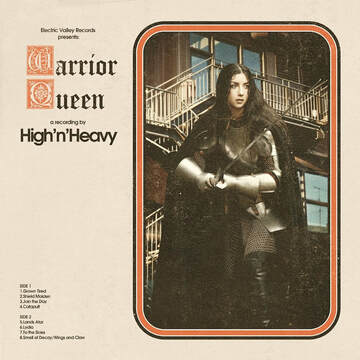 Dirty rock n’ roll--as High n’ Heavy self-describes their genre of choice--invokes a pretty obvious sonic palette: fuzz-ridden guitar, unrestrained bass, cigarette n’ whisky vocals. It’s a form of 70’s worship that works only if you throw yourself wholeheartedly into the aesthetic, and Warrior Queen is a perfect example of that sheer dedication in practice. With their latest LP, High n’ Heavy creates the medieval equivalent of a biker bar--instead of leather-swaddled Lemmys, picture a crew of six-string wielding knights in rusty armor. If you’re used to clean edges and keen production, look elsewhere. If, however, you like music that remains as fiercely dedicated to the amp as it is to the pipe...your quest is over, friend. High n’ Heavy reminds me of so many different bands from so many different genres, to the extent that listing them all feels, in many ways, counterproductive to actually describing what they sound like. That said, the unrefined edge of early Free or Zeppelin rears a bluesy head, and the Wolfmother vibes are particularly strong, especially in the stylistically overextended vocal delivery. Speaking of vocals, there’s a little bit of Circle Jerk’s gruffness swirling around as well. In terms of the retro scene from which they have spawned, there’s some Killer Boogie in the occasionally boppy riffage, and maybe High Reeper in the general scummy irreverence. Instrumentally, Warrior Queen takes a doomier bent than past outings, with Mike Dudley’s hefty low end bringing the atmosphere to greater depths, and John Steele’s riffage and keys lending the whole affair a deliciously antiquated glow. And while we’re running through the roster, Mr. Perrone keeps things rock-steady whilst maintaining a pleasing presence in the percussion department. Oftentimes, rock outfits suffer from an unsophisticated spread of talent--in other words, one person clearly rises above the rest. Not so here. As a unit, High n’ Heavy is workmanlike in that everyone seems to contribute substantially to the final product. That said, the vocals are High n’ Heavy’s most unique trait, plain n’ simple. Ranging from the Plant-esque howl of “Grown Tired,” to the punky shouts of “Catapult,” to the discordantly melodic strains of “Lydia,” the variety Kris Fortin brings is impressive, to say the least. A weak moment is evident on the intro to “Join the Day,” where some heavier instrumentation feels necessary to hold his reedy warble, but otherwise, Warrior Queen’s intrinsic rawness is very well balanced. All told, Warrior Queen is a highly enjoyable album from an understated band, an appropriately grungy dive into the dumpster of rock and stoner trappings. High n’ Heavy’s raw brand is dependent on a certain love for the fundamentally dirty spirit of rock n' roll, and for this commitment alone, I applaud them. Bottom line? This particular villager recommends you strap on your armor, ready your steel, and try the Warrior Queen on for size. While High n’ Heavy don’t smash genre barriers or present monumental songwriting chops, that’s not why they are here. And frankly, that’s not--and forgive me if I'm wrong--why any of us are here either. High n’ Heavy - Warrior Queen will be released Jan. 25th from Electric Valley Records |
Welcome!
We provide thoughtful reviews of music that is heavy, gloomy...and loud enough to wake us from slumber. Written by a highfalutin peasantry!
|
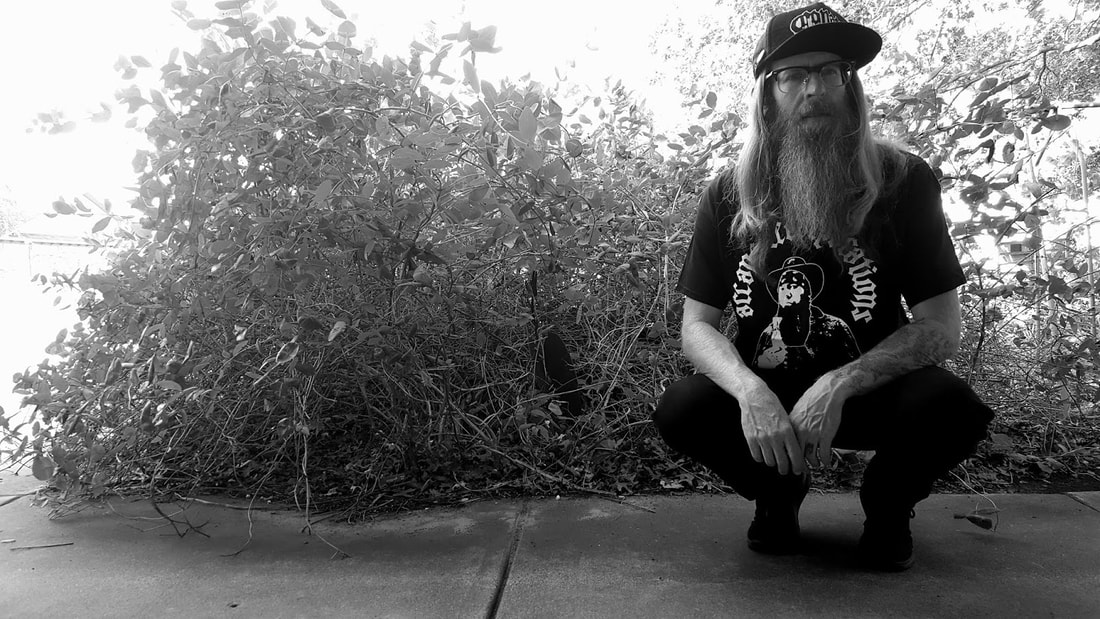
 RSS Feed
RSS Feed